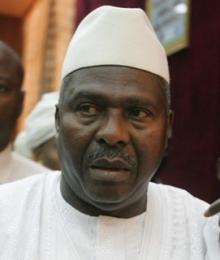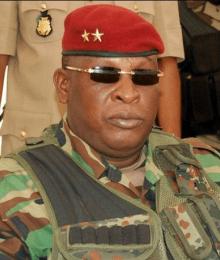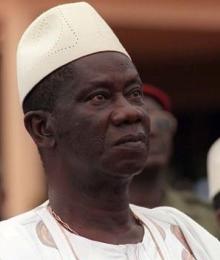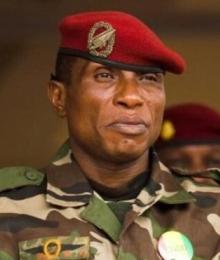
Ahmed Sékou Touré (1922-1984) was the first president of the Republic of Guinea and a key figure in the African independence movement. Born into the Mandinka aristocracy, he initially gained prominence as a trade unionist before becoming the leader of Guinea's independence movement. He led the country to independence in 1958, rejecting France's offer to join the French Community.
Touré's 26-year rule was initially marked by the adoption of a socialist regime and alignment with the Eastern Bloc, followed by a shift towards economic liberalism in the 1970s. While he is recognized for his efforts in national development and his role in pan-Africanism, his regime was also characterized by severe political repression and human rights abuses, leaving a controversial legacy in the history of Guinea and post-colonial Africa.
Introduction
Ahmed Sékou Touré, born on January 9, 1922, in Faranah, Guinea, and died on March 26, 1984, in Cleveland, United States, was the first president of the Republic of Guinea. A major figure in the independence movement and Pan-Africanism, he led the country from its independence in 1958 until his death in 1984. His 26-year reign was marked by a break with the former French colonial power, the adoption of a socialist regime followed by a shift towards economic liberalism, as well as controversial political repression.
Childhood and Education
Born into the Mandinka and Soninke aristocracy, Sékou Touré's maternal grandmother was Bagbè Ramata Touré, daughter of Almamy Samory Touré, a famous resistance fighter against French colonization in West Africa. His father, Alpha Touré, was a Soninke butcher of Sudanese origin (present-day Mali).
Raised in the Muslim faith, young Sékou first attended Koranic school before entering the French school system. He continued his studies at the Georges-Poiret technical high school in Conakry, from which he was expelled at 15 for leading a protest against the food served. During his youth, he became interested in the writings of communist philosophers, particularly Marx and Lenin, which would influence his future political thinking.
Struggle for Independence
Before independence, Sékou Touré worked for the postal services (PTT) where he faced a glass ceiling in his professional advancement. He then turned to trade unionism, becoming in 1945 the general secretary of the first union founded in Guinea, that of postal workers. He subsequently helped organize the Union of Confederate Trade Unions of Guinea (USCG), affiliated with the CGT.
In 1947, he participated in the founding of the Democratic Party of Guinea (PDG), a local branch of the African Democratic Rally (RDA), which campaigned for decolonization. He became one of the leaders of the RDA, working closely with Félix Houphouët-Boigny, the future president of Ivory Coast.
After two failures in the French legislative elections in 1951 and 1954, Sékou Touré was elected mayor of Conakry in 1955, then deputy in 1956. He used these positions to criticize colonial power. In 1957, he organized the General Union of Black African Workers.
The decisive turning point came on August 25, 1958, during General de Gaulle's visit to Conakry. Sékou Touré delivered a speech asserting Guinea's desire for independence, declaring that he preferred "poverty in freedom to wealth in slavery". On September 28, 1958, Guinea voted overwhelmingly "No" to the referendum on the French Community proposed by de Gaulle, thus becoming the only French-speaking African territory to choose immediate independence.
First President of the Republic of Guinea
On October 2, 1958, Guinea gained independence with Sékou Touré as its first president. The beginnings were difficult: France hastily withdrew its personnel and aid, leaving the young state in a precarious situation.
Sékou Touré then turned to the Eastern bloc, adopting a Marxist economic policy with the nationalization of foreign companies and centralized planning. He received the Lenin Peace Prize in 1961 in Moscow.
Domestically, Sékou Touré established a single-party regime around the PDG. He launched development projects and emphasized the promotion of Guinean national culture, particularly through music.
Break with France
From 1965 to 1975, Guinea broke off all diplomatic relations with France. Sékou Touré regularly accused the former colonial power of fomenting plots to overthrow him. This period was marked by strong repression against the opposition, justified by the fear of foreign interventions.
The regime moved closer to the socialist camp, benefiting from Chinese and Soviet aid. Sékou Touré became an important figure in the Pan-African movement and non-alignment. He supported liberation movements in Africa, notably Nelson Mandela's ANC, and offered asylum to African-American activists such as Stokely Carmichael.
Relations with France only began to normalize from 1975, under the presidency of Valéry Giscard d'Estaing.
Adoption of Economic Liberalism
From the 1970s, faced with persistent economic difficulties, Sékou Touré began a shift towards economic liberalism. In 1978, he officially renounced Marxism and sought to attract Western investments to develop the country's mineral resources.
This evolution was accompanied by a certain political relaxation. In 1977, after riots against trade restrictions, Sékou Touré relaxed controls on trade, offered amnesty to exiles, and released hundreds of political prisoners.
In 1982, he was re-elected unopposed for a fourth seven-year term. The following summer, he made a visit to the United States to promote investment in Guinea, admitting the failure of his previous Marxist policy.
Development Under His Regime
Despite economic difficulties, Sékou Touré's regime made some progress in terms of development:
- Education: expansion of the education system, literacy campaigns
- Health: construction of hospitals and health centers
- Infrastructure: development of road and rail networks
- Culture: promotion of Guinean languages and traditions, creation of the national music label Syliphone
However, these achievements were limited by poor economic management and international isolation for many years.
Political Situation in Guinea
Sékou Touré's regime was characterized by a single-party system centered on the PDG. Any opposition was severely repressed, notably through the infamous Camp Boiro.
According to Amnesty International, about 50,000 people were allegedly killed under Sékou Touré's regime between 1958 and 1984. Thousands of opponents and intellectuals fled the country to escape repression.
This repression culminated after the Portuguese invasion attempt of November 1970, known as Operation "Green Sea". The failure of this operation led to an unprecedented wave of repression affecting the entire Guinean society.
Death and End of the Regime
On March 26, 1984, Ahmed Sékou Touré died in Cleveland (USA) during emergency heart surgery. His unexpected death caused a political crisis in Guinea.
Prime Minister Louis Lansana Beavogui became interim president, but a week later, on April 3, 1984, the army seized power in a coup. Colonel Lansana Conté became the new head of state, ending 26 years of PDG rule.
The new authorities released about 1,000 political prisoners and closed Camp Boiro, a symbol of repression under Sékou Touré.
Tributes
Despite the controversy surrounding his regime, Sékou Touré remains an important figure in Guinean and African history. Several places bear his name:
- Conakry International Airport was renamed Ahmed Sékou Touré International Airport in 2021
- The presidential palace of Guinea is called Palais Sékhoutouréya
- Streets bear his name in several African cities (Accra, Cotonou)
Awards and Honors
- Lenin Peace Prize (1960)
- Grand Cross of the Order of Merit of Guinea
- Grand Cross of the Legion of Honor (France)
Private Life
Ahmed Sékou Touré was married to Andrée Touré (from 1953 until his death in 1984). They had two children: Aminata and Mohamed.
Publications
Sékou Touré was a prolific author, publishing numerous works on his political and economic vision. Among his best-known works:
- "Africa on the March"
- "Revolution and Religion"
- "Guinean Experience and African Unity"
- "Strategy and Tactics of the Revolution"
- "United States of Africa"
He also published a collection of poems.
Conclusion
Ahmed Sékou Touré remains a complex and controversial figure in African history. The first president of independent Guinea, he played a crucial role in the struggle against colonialism and the promotion of Pan-Africanism. His regime underwent significant changes, moving from Marxism to economic liberalism.
However, his legacy is overshadowed by the political repression and human rights violations that marked his rule. Guinea under Sékou Touré saw advances in education, health, and infrastructure, but also persistent economic difficulties linked to mismanagement and international isolation.
Sékou Touré's legacy continues to spark debates in Guinea and beyond. While some celebrate him as a hero of independence and a visionary Pan-African leader, others emphasize the authoritarian excesses of his regime. His journey illustrates the challenges faced by many post-independence African leaders, balancing aspirations for development, assertion of national sovereignty, and the temptation of personal power.
Today, the figure of Sékou Touré remains essential for understanding the history of Guinea and the political dynamics of post-colonial Africa. His influence is still felt in Guinean political life, more than three decades after his death.

















